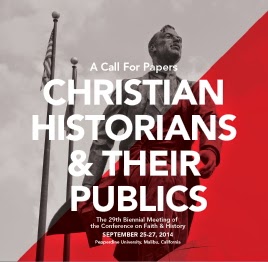In the future, I might write a formal review of U-Turn: Restoring America to the Strength of its Roots by George Barna and David Barton, but for now I am going to offer some preliminary reactions to it.
My first reaction was disappointment that George Barna would team up with document collector Barton. It is hard to imagine a more unified reaction from scholars, Christian and not, against Barton’s approach to history than occurred in 2012-2013. In August 2012, Barton’s book The Jefferson Lies was pulled from publication by Thomas Nelson due to lost confidence in the books facts. The book was voted least credible history book in print by readers of the History News Network. Academic reviewers were uniform in their criticism of the book. In 2013, the Family Research Council removed from view a video of Barton’s Capitol tour, and Focus on the Family had to admit that they edited radio presentations to remove errors. The actions taken by FRC and Focus on the Family followed complaints to the organizations by over three dozen Christian historians.
With a year like that, one would think it would take a public apology and a commitment to change in order to be published again, if ever, as a writer of history. Not so; Barton did none of that. And yet Charisma’s Frontline imprint paired Barton with George Barna to create a past useful for their apocalyptic warning.
The book begins with a series of assumptions:
Values largely reflect our emotional and experiential perspectives. Our beliefs typically stem more from our spirituality. Like values, beliefs play a powerful role in shaping our behavior. Our ideas about the existence, nature, and engagement of God; about the existence of absolute guidelines for right and wrong; about our ability to influence God’s responses to humanity through prayer; and about our sense of eternal destiny—all of these perspectives play a discernible role in how we view ourselves and our world and in the decisions and actions that come to define our lives.
As you will see, we are in the midst of a major era of change on the beliefs front, occurring in tandem with the changes related to our shifting values. As you consider the transitions in our beliefs, notice the inescapable interplay between values and beliefs. Their mutual influence means that a change in one necessitates a related change in the other in order for us to minimize our personal cognitive dissonance. Here is an overview of some of the central religious beliefs that characterize the American public today.
Barna, George; Barton, David (2014-10-21). U-Turn: Restoring America to the Strength of its Roots (Kindle Locations 643-647). Charisma House. Kindle Edition.
The book begins by proposing to describe the “American public.” The authors refer to “we” as if there is a “we” to refer to. I immediately distrust authors who claim to speak for me. In this case, such overgeneralization leads quickly to nonsense:
As you consider the transitions in our beliefs, notice the inescapable interplay between values and beliefs. Their mutual influence means that a change in one necessitates a related change in the other in order for us to minimize our personal cognitive dissonance.
The authors talk about “our beliefs” but then refer to “our personal cognitive dissonance.” Personal dissonance is personal, not collective. The authors strive mightily to create an “American public” straw man to castigate and rail against throughout the rest of the book. Ultimately, the authors want to move “us” back to a set of values that “we” once held. Survey data and history suffer due to this impulse.
Frequently throughout the first chapter, Barna and Barton cite statistics which convince them that Americans are less moral and less Christian than during past times and that the reason “we” are less moral is because “we” are less Christian. The authors then compare “us” now to “Early Americans” then. For instance, they write:
Early Americans believed that God’s Word applied to every aspect of daily life—a fact documented by any perusal of early sermons. If something important was in the news, then it was also covered from the pulpit with a biblical perspective. Consequently, it is easy to find countless early sermons on numerous topics never covered today, such as earthquakes, fires, droughts, and hurricanes;76 the execution of murderers;77 solar eclipses, the sighting of a comet, or the discovery of a new planet;78 national defense and foreign affairs;79 the duties of civil rulers and of citizens toward government;80 the issues associated with aging;81 immigration;82 education;83 medicine and medical issues;84 economics and taxation;85 and other practical topics.
Barna, George; Barton, David (2014-10-21). U-Turn: Restoring America to the Strength of its Roots (Kindle Locations 964-974). Charisma House. Kindle Edition.
Has David Barton never listened to the 700 Club? Or his good friend Kenneth Copeland? Those preachers talk about natural disasters, money, politics, etc. all the time. Kenneth Copeland and Barton believe PTSD can be cured with Bible verses. If his historical method was applied now, he would have to conclude that “we” are every bit as devout as the early Americans since examples of sermons about many current events can be located today.
Barton does in this book what he does in others. He finds quotes he likes and makes them representative of the view point he wants to support. For his analysis to have doomsday importance, he and Barna need to make the past look like a Christian society and the present look like a departure. In both cases, the reality of the situation is skewed.
To be continued…
